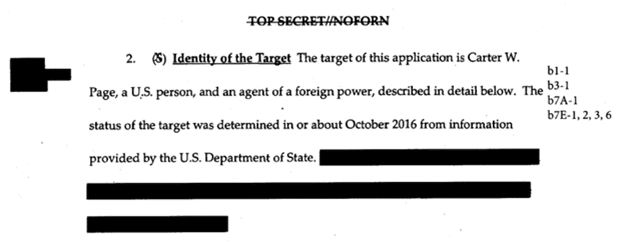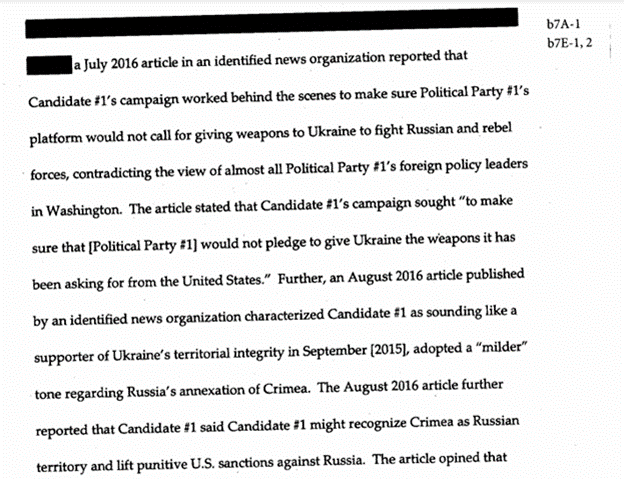April 27, 2023
Permission to republish original opeds and cartoons granted.
After spying on Trump, Congress should use FISA Section 702 reauthorization to end domestic political surveillance under Title I

By Robert Romano
“We need to make changes to the FISA process. I think we should not even reauthorize FISA, which is going to come up in the next Congress.”
That was House Judiciary Committee Chairman Jim Jordan (R-Ohio) — then the ranking member — in Oct. 2022, speaking with Fox Business’ Maria Bartiromo, outlining his opposition to reauthorization of section 702 of the Foreign Intelligence Surveillance Act (FISA), which expires on Dec. 31, 2023.
Executive branch officials say is critical to protecting national security will expire. It is the only section of FISA that sunsets on a periodic basis, and thus, provides a periodic opportunity for members of Congress to address the decades-long problem of domestic political surveillance.
That should be true, whether surveillance abuses are occurring under FISA’s section 702, or more usually — as in the case of the 2016 spying on the Trump campaign by the FBI and intelligence agencies — under Title I of the law, which is not up for reauthorization. But time and again, whenever the question of Section 702 has come up since 2008, attempts at intelligence reform are always deflected and rebuffed. “That’s the wrong section,” civil liberties groups are always told.
But Jordan thinks the abuses of the FBI and of the surveillance are directly related. In the interview with Bartiromo he outlined just a few of the more recent abuses: “In 2016, they spied on President Trump’s campaign. In 2018, it was the Mueller investigation. In 2020, they suppressed information about the Hunter Biden laptop. And, now in [2022], they have raided the home of a — of the former president, taken the phone of a sitting member of Congress 91 days before an election.”
In a recent interview with Americans for Limited Government President Rick Manning, former House Intelligence Committee Chairman Devin Nunes (R-Calif.), now CEO of Truth Social, addressed the upcoming section 702 reauthorization, stating, “So — so the problem is you only can take hostage that one piece… that’s the only piece that really goes it goes away. The rest of it stays there. So the question is, how do you and, you know, the FISA court is clearly guilty… [T]he FBI and all these jokers, whether or not it’s ever going to get proven, they knew from the very beginning that this was fraudulent and they went purposely to the FISA court. Remember, they relied on the judges… They knew what judge would [T]here’s enough circumstantial evidence. And of course with all of the avalanche of all the other evidence that we know, you’d have to be a fool to believe that this was concocted from the very beginning.”
Nunes added, “So the Congress would have to reauthorize 702.It’s only one small piece of FISA, so they got a hell of a mess on their hands because by just letting expire doesn’t fix the overall problem. It doesn’t stop what these corrupt people were able to do. It also doesn’t fix this — this new scheme of just happening to run FBI informants all over anyone who is — who is involved with the Republican Party.” But he added, "I think it’s going to be they really need something like a Church Commission that’s going to dissect the entire DOJ, the entire intelligence apparatus."
And yet, once all the information from Chairman Jordan's committee has been gathered, besides must-pass pieces of legislation, whether it be Section 702 reauthorization, the annual national defense authorizations, the $31.4 trillion national debt ceiling or the annual omnibus spending bills and appropriations bills, what other leverage do members of Congress have to enact reforms?
“Elections matter,” we are taught. And yet, since the advent of the modern filibuster in Rule XXII, requiring supermajorities, most recently 60 votes in the Senate, Republicans have never, ever had a filibuster-proof majority in the Senate, with which to enact reforms. And lacking a bipartisan consensus to act under normal order, reformers are left with simply these must-pass bills that permanent state needs to continue operating, whether by legal authorizations or spending authorizations — the only constitutional tether representatives and senators have to potentially reining in executive branch abuses directly under the constitutional Article I powers.
And no less than the two-party system is at stake. That is, the very mixed government that the American people voted just for in 2022 depends on this critical oversight to begin, as it is today, April 27, in a House Judiciary Committee subcommittee hearing entitled, “Fixing FISA: How a Law Designed to Protect Americans Has Been Weaponized Against Them.”
In his opening statement, U.S. Rep. Andy Biggs (R-Texas), stated, “the United States intelligence community has shown they cannot be fully trusted to retain this vast power. In fact, I cannot think of an example when a powerful intelligence tool was not abused in the United States in this way. When we give power to the federal government the federal government has abused that power seemingly every time.” He’s not wrong.
And the best example of FISA abuse that we know about, thanks to the declassification process lawfully undertaken by former President Donald Trump is the top-secret investigation by the Obama administration Department of Justice and intelligence agencies of the opposition party—the Trump campaign and the Republican Party—in the 2016 election that falsely accused Trump of being a Russian agent.
A good way to do that is to look at all of the laws that authorized the botched investigation, including the Dec. 2023 all but certain reauthorization of section 702 of the Foreign Intelligence Surveillance Act (FISA).
The broader law allows for surveillance of U.S. citizens even if they have not committed any crime on suspicion that they might be foreign agents, or perhaps in contact with foreign agents, even if it turns out to be made up.
To make the accusation, as happened with the Trump campaign beginning in Oct. 2016, the FBI and the Justice Department had to give the FISA Court a “statement of the facts and circumstances relied upon by the applicant to justify his belief that… the target of the electronic surveillance is a foreign power or an agent of a foreign power…”
The application to the FISA Court stated, “The target of this application is Carter W. Page, a U.S. person, and an agent of a foreign power… The status of the target was determined in or about October 2016 from information provided by the U.S. State Department…”

In part, those allegations relied on the Clinton campaign and DNC-financed Christopher Steele dossier that there was a “well-developed conspiracy” by Russia and the Trump campaign to hack the DNC and give their emails to Wikileaks.
But they also stated as part of the justification for that interference in the Trump campaign that Russia was attempting to convince the Trump campaign to not send weapons to Ukraine and to instead recognize Russia’s annexation of Crimea in Ukraine, telling the FISA Court that the Trump campaign “worked behind the sences to make sure [the Republican] platform would not call for giving weapons to Ukraine to fight Russian and rebel forces” stating Trump “might recognize Crimea as Russian territory and lift punitive U.S. sanctions against Russia,” citing news reports.
The Justice Department also included an Aug. 2016 Politico story highlighting Trump’s positions on Ukraine, including his suggestion the people of Crimea preferred to live in Russia, and his doubts that the territories Russia had seized could be reclaimed suggested without World War III, which Trump was running against on the campaign trail as much as Hillary Clinton.
At a Harrisburg, Pennsylvania, Politico quoted Trump saying a military conflict to take back Crimea would risk nuclear war: “You wanna go back? …You want to have World War III to get it back?” And it quoted Trump on ABC’s “This Week” suggesting the people of Crimea supported Russian annexation: “The people of Crimea, from what I’ve heard, would rather be with Russia than where they were.” This was Trump’s anti-war position in 2016 that helped him secure narrow wins in Pennsylvania, Michigan and Wisconsin and an Electoral College majority against Hillary Clinton, who he often called a war-monger.

So, that was the predicate before the FISA Court: A foreign power was allegedly attempting to influence the candidate, Trump, via campaign volunteers like Page but also hired help like Manafort, to simply recognize Russia’s claims to Ukraine’s sovereign territories in order to avert war.
During the convention, Paul Manafort was campaign chairman, who was swiftly removed by Trump after the New York Times non-coincidentally ran an erroneous hit piece in Aug. 2016 stating he had corrupt dealings in Ukraine, with a supposed ominous sounding “black ledger.” Manafort was the campaign manager of deposed former Ukrainian President Viktor Yanukovych when he was first elected in 2010. He also helped Gerald Ford secure the Republican nomination on the floor against Ronald Reagan in 1976, and then helped Reagan do the same thing in 1980. In 2016, Trump tapped him to win the convention by ensuring Trump delegates he won in the primaries would vote for him on the floor.
Page was similarly removed from the campaign when a Sept. 2016 news story appeared alleging, falsely as it turned out, he was a Russian agent.
Ultimately, former Special Counsel Robert Mueller found there was no Trump campaign conspiracy with Russia to hack the DNC and give the emails to Wikileaks. According to Mueller’s final report to the Attorney General, “the evidence was not sufficient to charge that any member of the Trump Campaign conspired or coordinated with representatives of the Russian government to interfere in the 2016 election.”
The report added, “In particular, the Office did not find evidence likely to prove beyond a reasonable doubt that Campaign officials such as Paul Manafort, George Papadopoulos, and Carter Page acted as agents of the Russian government — or at its direction, control or request — during the relevant time period.”
Manafort was brought up on unrelated tax and bank fraud charges. Cohen has his own set of problems, but being a Russian agent is not one of them. Per the Mueller report, “Cohen had never traveled to Prague…” And so, he very well could not have been there meeting with Russian intelligence officials. We knew that as early as Jan. 2017 when Buzzfeed published the dossier and Cohen showed his passport saying he had never been to the Czech Republic.
As for Page, he was never charged with anything. A footnote nonetheless attempted to justify the issuance of the FISA warrants against him, stating per Mueller, “On four occasions, the Foreign Intelligence Surveillance Court (FISC) issued warrants based on a finding of probable cause to believe that Page was an agent of a foreign power. 50 U.S.C. §§ 1801(b), 1805(a)(2)(A). The FISC’s probable-cause finding was based on a different (and lower) standard than the one governing the Office’s decision whether to bring charges against Page, which is whether admissible evidence would likely be sufficient to prove beyond a reasonable doubt that Page acted as an agent of the Russian Federation during the period at issue. Cf United States v. Cardoza, 713 F.3d 656, 660 (D.C. Cir. 2013) (explaining that probable cause requires only ‘a fair probability,’ and not ‘certainty, or proof beyond a reasonable doubt, or proof by a preponderance of the evidence’).”
Remarkably, it seems the Justice Department knew there was no conspiracy with Russia as early as 2017 as was revealed by Justice Department Inspector General Michael Horowitz, certainly by the time Mueller was appointed, but who kept the shameful inquiry going for another two years.
The FBI finally contacted former British spy Christopher Steele’s sources and after the surveillance had already been renewed once, in Jan. 2017. According to the inspector general report, once the main source that Steele used was contacted, “the Primary Sub-source made statements during his/her January 2017 FBI interview that were inconsistent with multiple sections of the Steele reports, including some that were relied upon in the FISA applications. Among other things, regarding the allegations attributed to Person 1, the Primary Sub-source’s account of these communications, if true, was not consistent with and, in fact, contradicted the allegations of a ‘well-developed conspiracy’…” Their case had collapsed. But on and on it went. Why?
As Congress considers FISA reauthorization, it must consider the only reasons we learn about any of this is because classified information was revealed to the public, in almost every case, via legal processes that were initiated by executive branch officials including the Attorney General, the President.
There is the exceptional case of Buzzfeed which published the Steele dossier in Jan. 2017, via First Amendment protected journalism. Steele and the Democrats were so anxious to shop the Russiagate story everywhere, they had distributed the dossier to major news outlets throughout the country. It was a gift to the American people, insofar as it would have required a declassification process to get at it.
Otherwise, all of these disclosures were completed by the Trump administration acquiescing to Congressional requests for information and Judicial Watch’s Freedom of Information Act (FOIA) request.
For example, the Justice Department Inspector General investigation by Michael Horowitz was only ever undertaken “in response to requests from the Attorney General and Members of Congress,” according to the March 28, 2018 statement issued by the Inspector General.
The Mueller report itself was ordered by the Attorney General and included its own declassification process. Portions of the Mueller report remain heavily redacted.
Much the same for the released transcripts of his phone calls between former National Security Advisor Michael Flynn and Russian Ambassador Sergei Kislyak on Dec. 23, 2016, Dec. 29, 2016 and Dec. 31, 2016 that showed Flynn engaging with Kislyak to stop a dangerous escalation in U.S.-Russian relations from occurring during the presidential transition of 2016 after the election were only ever revealed “[i]n response to bipartisan requests regarding the LTG Michael Flynn (Retired) transcripts” and were declassified by former President Donald Trump in 2020, according to the Director of National Intelligence’s office.
Flynn was similarly removed as National Security Advisor after the calls were non-coincidentally leaked to the Washington Post in Jan. 2017.
Yet more disclosures have been derived from the appointment of Special Counsel John Durham by former Attorney General William Barr. To the extent that we’re learning anything new from the prosecution of Igor Danchenko — for example that Steele was offered $1 million by the FBI to corroborate his allegations that former President Donald Trump was a Russian agent — is from court filings containing information that heretofore were classified.
In order to get this information out there required a President first having been targeted by FISA and then being so infuriated that he has sought to relentlessly expose the history of how the law was abused to the public. The crown jewel of that effort was on the day before he left office, former President Trump declassified a trove of documents related to the Justice Department’s botched investigation of Trump that falsely accused him and his 2016 presidential campaign of being Russian agents.
In the memorandum, entitled, “Memorandum on Declassification of Certain Materials Related to the FBI’s Crossfire Hurricane Investigation,” Trump outlined how the materials were presented to him to be declassified: “At my request, on December 30, 2020, the Department of Justice provided the White House with a binder of materials related to the Federal Bureau of Investigation’s Crossfire Hurricane investigation. Portions of the documents in the binder have remained classified and have not been released to the Congress or the public. I requested the documents so that a declassification review could be performed and so I could determine to what extent materials in the binder should be released in unclassified form. I determined that the materials in that binder should be declassified to the maximum extent possible.”
But not before the FBI complained about the need for redactions, with Trump granting the redactions: “In response, and as part of the iterative process of the declassification review, under a cover letter dated January 17, 2021, the Federal Bureau of Investigation noted its continuing objection to any further declassification of the materials in the binder and also, on the basis of a review that included Intelligence Community equities, identified the passages that it believed it was most crucial to keep from public disclosure. I have determined to accept the redactions proposed for continued classification by the FBI in that January 17 submission.”
The Trump memorandum continued, “I hereby declassify the remaining materials in the binder. This is my final determination under the declassification review and I have directed the Attorney General to implement the redactions proposed in the FBI’s January 17 submission and return to the White House an appropriately redacted copy.”
That redacted copy was never returned to the White House as ordered. In May, former Trump administration official Kash Patel said he witnessed the declassification himself in a phone interview with Breitbart.com, but that the documents remained unaltered and had retained their classified markings: “The White House counsel failed to generate the paperwork to change the classification markings, but that doesn’t mean the information wasn’t declassified. I was there with President Trump when he said ‘We are declassifying this information.’”
And the Biden Administration Justice Department led by Attorney General Merrick Garland never complied with the Trump memorandum either, Senate Judiciary Committee Ranking Member Chuck Grassley (R-Iowa) and Sen. Ron Johnson (R-Wis.) revealed in a Feb. 15, 2022 letter to Garland. It was a follow-up to an Oct. 2021 letter on the same complaining about the lack of disclosure.
These appear to be the same documents the FBI raided from Trump’s residence in Palm Beach, Fla., Mar-a-Lago, on Aug. 8. On Truth Social, on Aug. 12, Trump noted that “it was all declassified,” referring to the documents seized.
Thanks to the disclosures of political enemies of the state being investigated by a secret police, public opinion of the FBI and the Justice Department, especially among Republicans, is at an all-time low. And the more we learn, the lower that opinion will become.
The whole reason the Foreign Intelligence Surveillance Act of 1978 was adopted was prevent unconstitutional domestic spying. A select committee headed by Sen. Frank Church (D-Idaho) convened in 1975 to get to the bottom of revelations by Seymour Hersh’s explosive report to the New York Times on Dec. 22, 1974 that the CIA had been engaged a mass, domestic surveillance program against anti-war protestors, members of Congress and other political figures.
On NBC’s Meet the Press on Aug. 17, 1975, Church who had led the committee warned, “If this government ever became a tyranny, if a dictator ever took charge in this country, the technological capacity that the intelligence community has given the government could enable it to impose total tyranny, and there would be no way to fight back because the most careful effort to combine together in resistance to the government, no matter how privately it was done, is within the reach of the government to know. Such is the capability of this technology…”
Church added, “I don’t want to see this country ever go across the bridge. I know the capacity that is there to make tyranny total in America, and we must see to it that this agency and all agencies that possess this technology operate within the law and under proper supervision so that we never cross over that abyss. That is the abyss from which there is no return.”
The committee led to the adoption of the law, which sought to reform how intelligence is gathered and the limited circumstances it can be used in the U.S.
Sadly, FISA has become a rubber stamp and an instrument of not merely political surveillance, but of one-party rule and even has been used to push the U.S. closer to nuclear war with Russia, which we are now on the apparent brink of. As for the surveillance in the U.S., it was clearly targeted at Trump and Republicans, and is rotten to the core. Disclosure is what it fears the most because that is the only way to make it stop.
And disclosure is what Congress should demand of the declassified Russiagate papers, which it should absolutely subpoena, so that it can conduct public oversight of this system’s abuses. The American people have a right to know just how much the Justice Department and the FBI are interfering with our elections. Without these particular documents, it might be impossible to ever reform this system.
Since taking office, Biden has gone even further with abusive prosecutions of Republicans, even raiding Trump’s home, not to mention the censorship by the FBI’s Foreign Influence Task Force and the Department of Homeland Security’s Cybersecurity and Infrastructure Security Agency of Republicans and conservatives on social media.
This is a push for a tyrannical one-party system with little to no opposition. In a Twitter video on April 26, former Fox News host Tucker Carlson warned that “Suddenly, the United States looks very much like a one-party state.” He’s not wrong.
Carlson added, “the undeniably big topics, the ones that will define our future get virtually no discussion at all: war, civil liberties, emerging science, demographic change, corporate power, natural resources. When was the last time you heard a legitimate debate about any of those issues? It’s been a very long time. Debates like that are not permitted in American media. Both political parties and their donors have reached consensus on what benefits them, and they actively collude to shut down any conversation about it.”
Right again. And with the House hearings on FISA abuse taking place this week, one of the issues Carlson almost certainly would have been discussing this week was the surveillance state — and the bipartisan consensus that to this day protects it. The hearings and what’s exposed at them are important, but what Congress and the American people do with that information is even more important, by demanding reforms or else these abuses will continue, and the “total tyranny” that Sen. Church warned about will become the reality we all must live with. In many ways, we already are, and what the members of Congress may not yet realize is it will be used against them, too, because it already is. It’s already interfering with our elections. It’s already hindering our ability to speak out. And if Congress doesn’t do something about it soon, it might become too late.
Robert Romano is the Vice President of Public Policy at Americans for Limited Government.
Cartoon: Hot To Trot
By A.F. Branco

Click here for a higher level resolution version.
To view online: https://dailytorch.com/2023/04/cartoon-hot-to-trot/
Video: Fox News EMBRACES ESG Since 2020! Tucker Carlson FIRED For A Reason.
To view online: https://www.youtube.com/watch?v=z-FVTp-ge1g

Pass the Limit, Save, Grow Act and restore fiscal sanity–before it’s too late
April 26, 2023, Fairfax, Va.—Americans for Limited Government President Rick Manning today issued the following statement urging passage of the H.R. 2811, the Limit, Save, Grow Act:
“Our nation is at a precipice of the $31. 4 trillion national debt which threatens our economic viability in unimaginable ways. When combined with the threat to the U.S. dollar as the world reserve currency, it is unimaginable that anyone would vote against legislation which responsibly cuts the size and scope of a federal government that has been artificially bloated by the Covid response.
“America cannot kick the spending can down the road any further. We understand the distaste with raising the debt ceiling, but it would be an enormous mistake to miss this opportunity for the House to not only cut the fiscal growth of government, but also to pass the REINS Act and energy production permitting reform to put our nation back on the pathway to energy dominance.
“Please vote in favor of H.R. 2811.”
To view online: https://getliberty.org/2023/04/time-to-pass-the-limit-save-grow-act-and-restore-fiscal-sanity-before-its-too-late/




